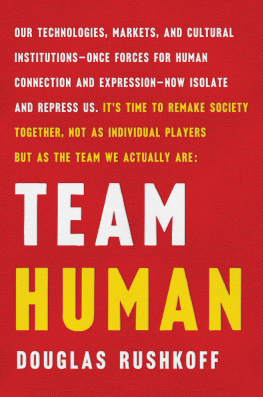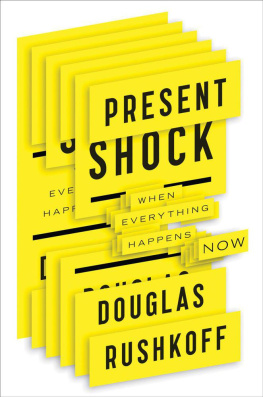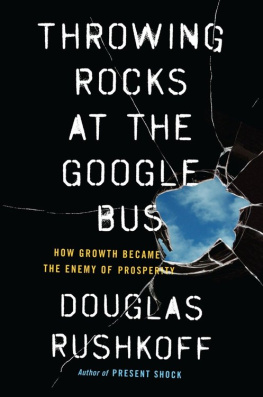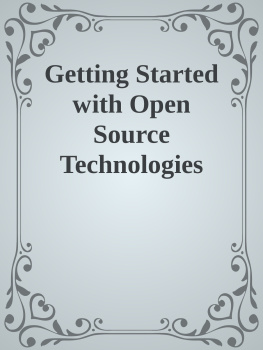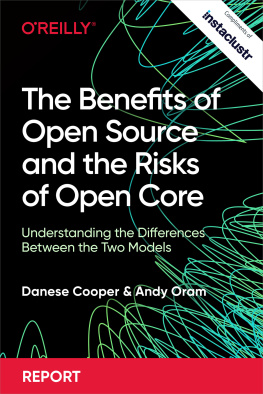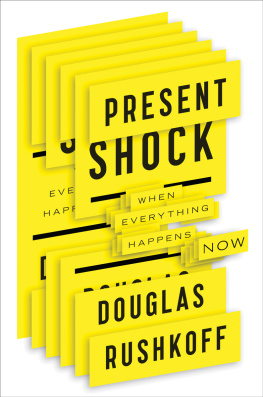Copyright (C) 2003 by Douglas Rushkoff. This Project Gutenberg is also available online at: http://www.demos.co.uk/catalogue/opensourcedemocracy_page292.aspx
This eBook is available under the Demos Open Access License, which appears at the end of this text and online at: http://www.demos.co.uk/aboutus/licence_page295.aspx
Title page:
Open Source Democracy
How online communication is changing offline politics
by Douglas Rushkoff
Acknowledgements
Thanks to Tom Bentley and everyone at Demos for the opportunity to extend this inquiry to a new community of thinkers. Thanks also to my editorial assistant, Brooke Belisle, and to colleagues including Andrew Shapiro, Steven Johnson, Ted Byfield, Richard Barbrook, David Bennahum, Red Burns, Eugenie Furniss and Lance Strate.
Introduction
The emergence of the interactive mediaspace may offer a new model for cooperation. Although it may have disappointed many in the technology industry, the rise of interactive media, the birth of a new medium, the battle to control it and the downfall of the first victorious camp, taught us a lot about the relationship of ideas to the media through which they are disseminated. Those who witnessed, or better, have participated in the development of the interactive mediaspace have a very new understanding of the way that cultural narratives are developed, monopolised and challenged. And this knowledge extends, by allegory and experience, to areas far beyond digital culture, to the broader challenges of our time.
As the world confronts the impact of globalism, newly revitalised threats of fundamentalism, and the emergence of seemingly irreconcilable value systems, it is incumbent upon us to generate a new reason to believe that living interdependently is not only possible, but preferable to the competitive individualism, ethnocentrism, nationalism and particularism that have characterised so much of late 20th century thinking and culture.
The values engendered by our fledgling networked culture may, in fact, help a world struggling with the impact of globalism, the lure of fundamentalism and the clash of conflicting value systems. Thanks to the actual and allegorical role of interactive technologies in our work and lives, we may now have the ability to understand many social and political constructs in very new contexts. We may now be able to launch the kinds of conversations that change the relationship of individuals, parties, creeds and nations to one another and to the world at large. These interactive communication technologies could even help us to understand autonomy as a collective phenomenon, a shared state that emerges spontaneously and quite naturally when people are allowed to participate actively in their mutual self-interest.
The emergence of the internet as a self-organising community, its subsequent co-option by business interests, the resulting collapse of the dot.com pyramid and the more recent self-conscious revival of interactive media's most participatory forums, serve as a case study in the politics of renaissance. The battle for control over new and little understood communication technologies has rendered transparent many of the agendas implicit in our political and cultural narratives. Meanwhile, the technologies themselves empower individuals to take part in the creation of new narratives. Thus, in an era when crass perversions of populism, and exaggerated calls for national security, threaten the very premises of representational democracy and free discourse, interactive technologies offer us a ray of hope for a renewed spirit of genuine civic engagement.
The very survival of democracy as a functional reality may be dependent upon our acceptance, as individuals, of adult roles in conceiving and stewarding the shape and direction of society. And we may get our best rehearsal for these roles online.
In short, the interactive mediaspace offers a new way of understanding civilisation itself, and a new set of good reasons for engaging with civic reality more fully in the face of what are often perceived (or taught) to be the many risks and compromises associated with cooperative behaviour. Sadly, thanks to the proliferation of traditional top-down media and propaganda, both marketers and politicians have succeeded in their efforts to turn neighbour against neighbour, city against city, and nation against nation. While such strategies sell more products, earn more votes and inspire a sense of exclusive salvation (we can't share, participate, or heaven forbid collaborate with people whom we've been taught not to trust) they imperil what is left of civil society. They threaten the last small hope for averting millions of deaths in the next set of faith-justified oil wars.
As the mainstream mediaspace, particularly in the United States, becomes increasingly centralised and profit-driven, its ability to offer a multiplicity of perspectives on affairs of global importance is diminished. In America, broadcasting the Iraq war meant selling the Iraq war. Each of the media conglomerates broadcast the American regime's carefully concocted narrative, so much so that by the time the war actually began a Knight Ridder poll found half of Americans believed that Iraqis had participated directly as hijackers on 9 September 2001. The further embedded among coalition troops that mainstream reporters were, the further embedded in the language and priorities of the Pentagon they became. Dispatches regularly referred to the deaths of Iraqi soldiers as the 'softening of enemy positions', bombing strikes as 'targets of opportunity', and civilian deaths as the now-laughable 'collateral damage'. This was the propagandist motive for embedding reporters in the first place: when journalists' lives are dependent on the success of the troops with whom they are travelling, their coverage becomes skewed.
But this did not stop many of the journalists from creating their own weblogs, or blogs: internet diaries through which they could share their more candid responses to the bigger questions of the war. Journalists' personal entries provided a much broader range of opinions on both the strategies and motivations of all sides in the conflict than were available, particularly to Americans, on broadcast and cable television.
For an even wider assortment of perspectives, internet users were free to engage directly with the so-called enemy, as in the case of a blog called Dear Raed, written by what most internet experts came to regard as a real person living in Baghdad, voicing his opposition to the war. This daily journal of high aspirations for peace and a better life in Baghdad became one of the most read sources of information and opinion about the war on the web.
Clearly, the success of sites like Dear Raed stem from our increasingly complex society's need for a multiplicity of points of view on our most pressing issues, particularly when confronted by a mainstream mediaspace that appears to be converging on single, corporate and government approved agenda. These alternative information sources are being given more attention and credence than they might actually deserve, but this is only because they are the only ready source of oppositional, or even independent thinking available. Those who choose to compose and disseminate alternative value systems may be working against the current and increasingly concretised mythologies of market, church and state, but they ultimately hold the keys to the rebirth of all three institutions in an entirely new context.
The communications revolution may not have brought with it either salvation for the world's stock exchanges or the technological infrastructure for a new global resource distribution system. Though one possible direction for the implementation of new media technology may be exhausted, its other myriad potentials beckon us once again. While it may not provide us with a template for sure-fire business and marketing solutions, the rise of interactive media does provide us with the beginnings of new metaphors for cooperation, new faith in the power of networked activity and new evidence of our ability to participate actively in the authorship of our collective destiny.



